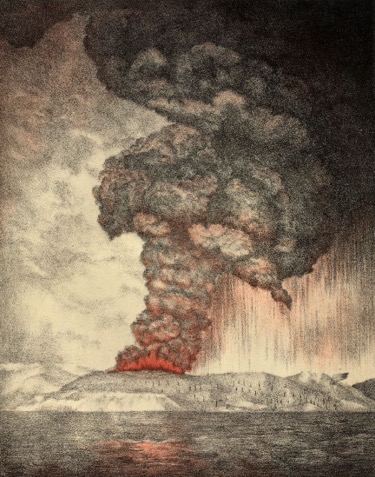

- © 2003 - 2025 Dynamix Productions, Inc. Contact Us 0



My favorite saying is, 'If it's too loud, turn it up.'
Tori Amos
You often hear the phrase "The shot heard 'round the world," referring to the first shot fired of the American Revolution in Lexington, Massachusetts. Or for us baseball fans, Bobby Thompson's dramatic game-winning home run when the New York Giants beat the Brooklyn Dodgers for a trip to the 1951 World Series. Both of these pale in comparison to the 1883 explosion of the Krakatoa volcano. Dubbed as the loudest sound in history, it was also the farthest traveled.
The volcano in Indonesia had been causing earthquakes in the years before eruption. In the months before eruption, there were a series of explosions, ash venting, and more earthquakes. Like a covered pot about to boil over, explosions and earthquakes intensified with more frequency in the days leading up to this historic event. Then on August 26, four explosions occurred. The first two eruptions, very powerful in their own right, created 120-foot tsunamis that traveled as far away as South Africa. The third eruption, the grand daddy of them all, is considered the loudest in history.
Here's some perspective. Forty miles away, sailors' eardrums burst from the blast. Pressure gauges on natural gas storage tanks a hundred miles away in modern day Jakarta went off the scale. The sound could be clearly heard 3,100 miles away in Perth, Australia (that's like from Lexington to Fairbanks, Alaska). Barographs (barometers that record air pressure changes on paper) all over the world recorded the event over the next 5 days. The pressure wave from the blast circled the earth three-and-a-half times. Now that's loud.
How loud? It's calculated that 100 miles away, the blast was registered at 180 dB-SPL. For some context, normal conversation is about 60 dB, a jackhammer is 100 dB, the threshold of pain is 140 dB, and a jet engine is 150 dB. At 150 dB, breathing is difficult, eardrums burst, and the temperature drops about 25 degrees. At 170 dB, glass shatters, fog forms as water in the air drops out of suspension, breathing is impossible, and organ damage occurs. I've recorded sound effects at Civil War reenactments, and cannon fire clocks in at about 120 dB at about 50 feet away. The concussion from the pressure wave feels like someone lightly bumping into you. It's theorized that at the Krakatoa blast site, the sound was 310 dB.
The explosive force was roughly 10,000 times more powerful than the atomic bomb dropped on Hiroshima, and ten times more powerful than the Mount St. Helens eruption. Seventy percent of the island was destroyed by the eruptions. Eleven cubic miles of debris were hurled into the atmosphere, including 600-ton coral rocks that fell on nearby islands. Ash fell on ships 4,000 miles away. The islands around the eruption were dark for two days. For the next three months ash particles caused vivid sunsets around the world, and dispatched fire brigades to imagined distant fires on the horizon. The global temperature dropped 2.2 F degrees over the next 5 years.
The worst statistic of all is that 36,000 people died, mostly from the tsunamis. Twenty eight of those were sailors on a steamship in Sumatra that was carried by the wave a mile inland. That tsunami also destroyed 165 nearby seaside villages. Tidal waves, speeding along at more than 300 miles-per-hour, were recorded 3,800 miles away just 12 hours later.
How does Krakatoa compare to other recent volcanic eruptions? On a scale of 0 to 8, the Volcanic Explosivity Index (VEI) lists Krakatoa as a VEI-6. Mount St. Helens in 1980 was a VEI-5. Mount Tambora in Indonesia in 1815 was a VEI-7 and was the most powerful in recorded history. The worst, VEI-8, is infrequent, cataclysmic, and continent shaping.
Outside of a volcano or a large meteor hit, what other extremely loud natural sounds would you encounter in your lifetime? An elephant trumpets at 103 dB. An African cicada clicks at 106 dB. A clap of thunder is 120 dB. The greater bulldog bat cries at 140 dB. A sperm whale's echolocation clicks, if above the water, are about 170 dB. But the big one that tops them all is actually pretty small. The pistol shrimp, when snapping its claw shut, creates a bubble that bursts the surface of water with a 200 dB shock wave. It sounds like the pistol shrimp needs to be renamed the Krakatoa shrimp, a true dichotomy of words.